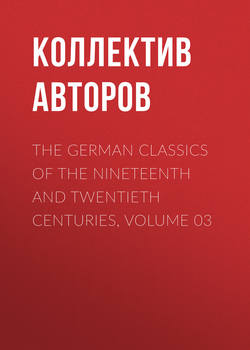Читать книгу The German Classics of the Nineteenth and Twentieth Centuries, Volume 03 - Коллектив авторов, Ю. Д. Земенков, Koostaja: Ajakiri New Scientist - Страница 4
POEMS
THE VEILED IMAGE AT SAÏS (1795)
ОглавлениеA youth, whom wisdom's warm desire had lured
To learn the secret lore of Egypt's priests,
To Saïs came. And soon, from step to step
Of upward mystery, swept his rapid soul!
Still ever sped the glorious Hope along,
Nor could the parch'd Impatience halt, appeased
By the calm answer of the Hierophant—
"What have I, if I have not all," he sigh'd;
"And giv'st thou but the little and the more?
Does thy truth dwindle to the gauge of gold,
A sum that man may smaller or less small
Possess and count—subtract or add to—still?
Is not TRUTH one and indivisible?
Take from the Harmony a single tone
A single tint take from the Iris bow—
And lo! what once was all, is nothing—while
Fails to the lovely whole one tint or tone!"
They stood within the temple's silent dome,
And, as the young man paused abrupt, his gaze
Upon a veil'd and giant IMAGE fell:
Amazed he turn'd unto his guide—"And what
Towers, yonder, vast beneath the veil?"
"THE TRUTH,"
Answered the Priest.
"And have I for the truth
Panted and struggled with a lonely soul,
And yon the thin and ceremonial robe
That wraps her from mine eyes?"
Replied the Priest,
"There shrouds herself the still Divinity.
Hear, and revere her best: 'Till I this veil
Lift—may no mortal-born presume to raise;
And who with guilty and unhallow'd hand
Too soon profanes the Holy and Forbidden—
He,' says the goddess."—
"Well?"
"'SHALL SEE THE TRUTH!'"
"And wond'rous oracle; and hast thou never
Lifted the veil?"
"No! nor desired to raise!"
"What! nor desired? O strange, incurious heart,
Here the thin barrier—there reveal'd the truth!"
Mildly return'd the priestly master: "Son,
More mighty than thou dream'st of, Holy Law
Spreads interwoven in yon slender web,
Air-light to touch—lead-heavy to the soul!"
The young man, thoughtful, turn'd him to his home,
And the sharp fever of the Wish to Know
Robb'd night of sleep. Around his couch he roll'd,
Till midnight hatch'd resolve—
"Unto the shrine!"
Stealthily on, the involuntary tread
Bears him—he gains the boundary, scales the wall,
And midway in the inmost, holiest dome,
Strides with adventurous step the daring man.
Now halts he where the lifeless Silence sleeps
In the embrace of mournful Solitude;—
Silence unstirr'd—save where the guilty tread
Call'd the dull echo from mysterious vaults!
High from the opening of the dome above,
Came with wan smile the silver-shining moon.
And, awful as some pale presiding god,
Dim-gleaming through the hush of that large gloom,
In its wan veil the Giant Image stood.
With an unsteady step he onward past,
Already touch'd the violating hand
The Holy—and recoil'd! a shudder thrill'd
His limbs, fire-hot and icy-cold in turns,
As if invisible arms would pluck the soul
Back from the deed.
"O miserable man!
What would'st thou?" (Thus within the inmost heart
Murmur'd the warning whisper.) "Wilt thou dare
The All-hallow'd to profane? 'No mortal-born'
(So spake the oracular word)—'may lift the veil
Till I myself shall raise!' Yet said it not—
The same oracular word—'who lifts the veil
Shall see the truth?' Behind, be what there may,
I dare the hazard—I will lift the veil—"
Loud rang his shouting voice—"and I will see!"
"SEE!"
A lengthen'd echo, mocking, shrill'd again!
He spoke and rais'd the veil! And ask'st thou what
Unto the sacrilegious gaze lay bare?
I know not—pale and senseless, stretch'd before
The statue of the great Egyptian queen,
The priests beheld him at the dawn of day;
But what he saw, or what did there befall,
His lips reveal'd not. Ever from his heart
Was fled the sweet serenity of life,
And the deep anguish dug the early grave
"Woe—woe to him"—such were his warning words,
Answering some curious and impetuous brain,
"Woe—for her face shall charm him never more!
Woe—woe to him who treads through Guilt to TRUTH!"
* * * * *
